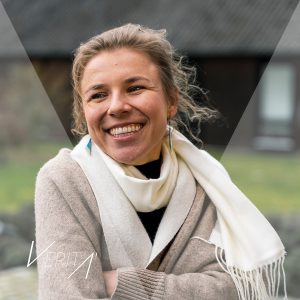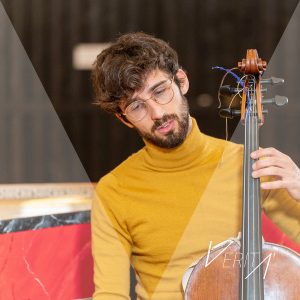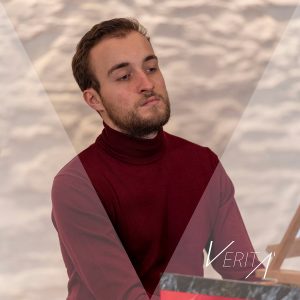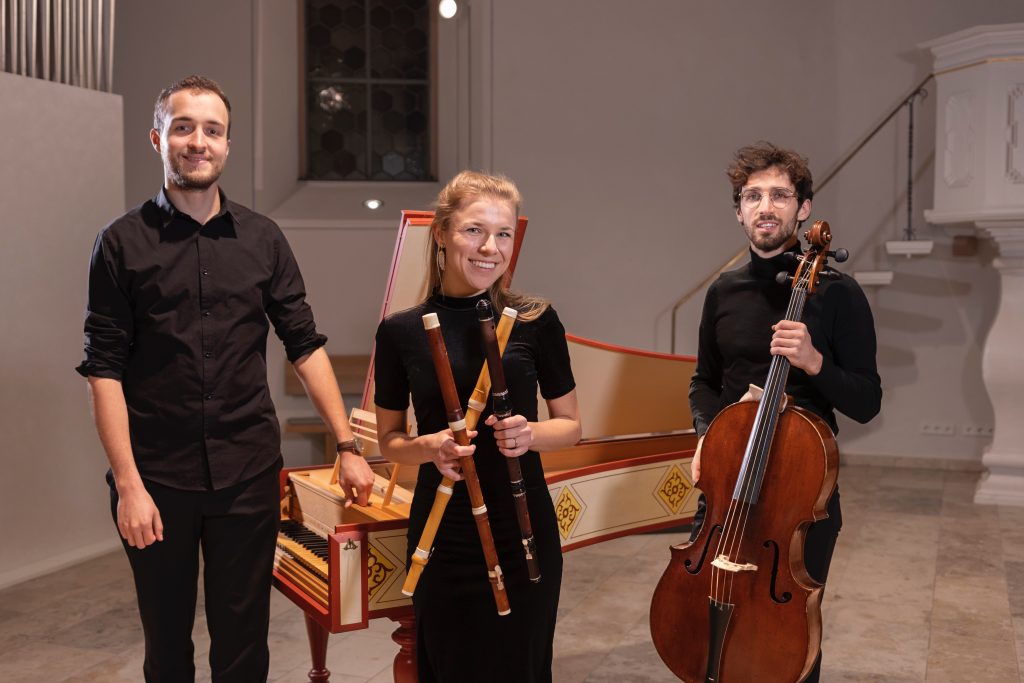Artists
Program
Program Notes
Preview
Performances
Bios
VERITÀ is a historically-informed chamber ensemble dedicated to seeking truth through research, expression, and communication in music.
Founded in 2020, during a most challenging time for many artists, VERITÀ is committed to creating a musical home for everyone — a community that connects people by uniting music with a variety of art forms. Based in Germany, VERITÀ’s core is comprised of three established musicians from all over the world: harpsichordist Alexander von Heissen from Germany, cellist Bartolomeo from Italy, and flutist Taya König-Tarasevich from Siberia. VERITÀ explores pieces far beyond the Baroque era, tapping into works from the Renaissance, expanding into the late Classical and Romantic epochs, and beyond. Despite VERITA’s traditional instrumentation, the ensemble regularly commissions new works to present a wide variety of repertoire, including works by living composers and collaborations with living artists such as dancers, painters and poets. VERITÀ is committed to bringing artistic excellence together with emotion on its never- ending search for truth.
Artists
Taya König-Tarasevich
Bartolomeo Dandolo Marchesi
Alexander von Heißen
Program
Schaffrath, Christoph (1709-1763)
Trio Sonata in D major, CSWV E:3
Allegro
Adagio
Allegro
Telemann, Georg Philipp (1681-1767)
Sonata Metodica Nr. 3 in E minor Grave
Vivace
Cunando Vivace
Lotti, Antonio (1667-1740)
Trio Sonata in G major
Largo
Allegro
Adagio Vivace
Porpora, Nicola (1686-1768)/Costanzi, Giovanni Battista (1704-1778)
Sonata in G major
Adagio
Allegro
Adagio staccato
Program Notes
Innovative play with and inversion of familiar instrumental roles underpin this lush and feisty program for flute, cello, and harpsichord. We begin with the Berlin composer Christoph Schaffrath (1709-1763), whose musical journey began in the Prussian court of Frederick the Great, where he was hired as the harpsichordist. Among those who advocated for him included the famous flute virtuoso Johann Joachim Quantz, who very likely was the first to perform the work that we present in our program, the Trio Sonata in D major, CSWV E:3. It is no coincidence that his music carries a resemblance to the music of C.P.E. Bach, as they were in close contact and even shared their duties at the court. Despite the outward similarities, however, perceivable features distinguish his work. For one, ornamentation. We strive in our performance to ornament this already heavily ornamented work with tasteful additions suitable for a court; perhaps these are the echos of the detailed intricacies of the Sanssouci of Frederick the Great. Also, this work is unique as each movement begins by establishing the cello as a melody instrument. Breaking free from its usual role as a continuo instrument, the cello does not merely play a supporting role but serves in an essential partnership with the flute.
The next sonata by Georg Philipp Telemann is the only piece on our program where the cello plays the role of basso continuo, supporting and leading the flute at the same time. Upon encountering this set of sonatas titled the „Methodical Sonatas,“ one may assume them to have an instructional function, and thus, to be musically amateur. These pieces for solo violin or flute with accompaniment, however, are not intended for instruction in performance, rather, instruction in ornamentation. In his publication, he provides the bare melody and underneath it, his suggested ornamentation of the given melody. Ultimately, Telemann encourages the performer to learn via emulation.
Not only German musicians were hired by the courts: the organist Antonio Lotti (1667-1740) was appointed by Frederich Augustus I of Saxony as resident composer of sacred and secular music for the Dresden court. As Lotti attempted to bring Italian opera troups to perform his work, several German musicians (among them Johann Christoph Schmidt) saw him as a threat and attempted to thwart his musical presence and influence in the court. Perhaps this lead to his eventual retreat back to Venice, where he was highly sought after as a composition teacher. Experienced in both sacred and secular music, as well as vocal and instrumental texture, Lotti displays a mastery of compositional techniques. In his Trio for flute, viola da gamba and harpsichord, Lotti does not shy from showing the affordances of the particular solo instruments. One question does arise for the performer: was viola da gamba the bass instrument that the second solo part written for? Though we may never be sure, the fact that Lotti doesn’t use the two lowest strings of viola da gamba cause the speculation whether it was a different instrument this part was written for. Could the four-stringed Violoncello Piccolo have been the intended instrument by Lotti?
In our final piece in the program, we present a work with mysterious origins: In 1745 John Walsh published a co-authored set of works by Nicola Porpora (1686-1768) and Giovanni Battista Costanzi (1704-1778). Such rare cooperation causes one to wonder why the work was published as such: Did both composers truly contribute equally to each work? Or had they compiled works that they individually composed? To add to the confusion, no complete score exists. With a book of the Violin Primo, the Violin Secondo, and yet another of the obligato cello along with the figured bass – the musicians are left to piece together a puzzle: Had this work been intended for two violins? Two cellos? A violin and a cello? In any case, we took the liberty to arrange it for two melodic instruments which presented very few challenges. As Porpora generally attempted to emulator the human voice and its expressiven nuances, his works seem to suit all melody instruments. Especially notable in this set is the slow movement, where the fundamental roles of the flute and cello are inverted, with the flute accompanying the cello’s lament.
Preview
Performances
Musicivic Everywhere
Sun 3:00 PM ET 4/25/21 (Thee Villages)
Wed 7:30 PM ET 5/5/21 (Early Music Wednesdays)
Fri 7:30 PM ET 5/14/21 (Twin Forks)
Free Tickets
Ambler Musicivic
Sun 3:00 PM ET 4/18/21
Fri 7:30 PM ET 4/23/21
Free Tickets
Three Village Chamber Players
Sun 3:00 PM ET 4/25/21
Fri 7:30 PM ET 4/30/21
Free Tickets
Twin Forks Musicivic
Sun 3:00 PM ET 5/14/21
Fri 7:30 PM ET 5/19/21
Free Tickets
Oakmont Musicivic
Sun 3:00 PM ET 5/30/21
Fri 7:30 PM ET 6/4/21
Free Tickets
Big Sky Musicivic
TBD
Free Tickets
Bios

TAYA KÖNIG-TARASEVICH
Period Flutes
Co-founder
Artistic Director
Siberian flutist Taya König-Tarasevich enjoys an international career as soloist, chamber musician, and orchestral performer on renaissance, baroque, classical, romantic, and modern flutes. A recent graduate of The Juilliard School, Taya is a proud co-founder and artistic director of VERITÀ ensemble, a historically-informed ensemble dedicated to seeking truth through research, expression, and communication in music. Taya is committed to authentic performances that are faithful to the approach and style of the musical era in which a work was originally composed.
Taya’s recent highlights include four residencies in four different cities in Germany with ensemble VERITÀ. Taya was honored to perform with Les Arts Florissants in August 2020 alongside William Christie in his gardens in Thiré, France. She appeared as a guest soloist in the Fall of 2020 with the Dallas Bach Society, performing works by Bach and Beethoven and looks forward to returning to perform with them again in May 2021. Taya is a Smithsonian Chamber Musician fellow and has performed regularly at the museum on historical instruments provided by the museum. Taya performed with the Philharmonia Baroque in San Francisco under the direction of Nick McGegan in 2019. As a featured soloist, Taya performed on a ten city tour in New Zealand with Juilliard 415 performing Vivaldi’s La Notte Concerto. She was also a featured soloist with Rachel Podger performing double concerto by Vivaldi while on tour in Canada. Taya’s has performed around the globe with Juilliard 415 in countries such as the United States, Norway, Sweden, Finland, and Denmark under the direction of prestigious music directors such as Masaaki Suzuki, Kristian Bezuidenhout, Pablo Heras-Casado, Richard Egarr, and Alfredo Bernardini. Inspired by her experiences performing and working with prominent artists and maestros, Taya is producing digital performances with her ensemble, VERITA.
While Taya is fluent in English, German, Italian and Russian she believes that music speaks a language of its own. A language that reaches deep within the listener touching desires and awakening delights while opening our ears and the eyes of our soul to the depths of beauty. Taya is grateful to have studied with the best teachers from Russia, Germany and the U.S. she holds degrees from Musikhochschule Karlsruhe, University of Michigan and The Juilliard School.

BARTOLOMEO DANDOLO MARCHESI
Violoncello
Co-founder
Musical Director
Bartolomeo Dandolo Marchesi, born in 1994, began studying the cello according to the Suzuki method at the age of three, continuing his studies with Antonio Mosca. He graduated with honours at the G. Verdi Music Conservatory in Milan under the guidance of Marco Bernardin. He studied later at the Musikhochschule in Cologne with Nicolas Altstaedt and baroque cello with Rainer Zipperling and completed with honours a Master of Early Music at the Musikhochschule in Frankfurt under the guidance of Kristin von der Goltz.
He had the privilege of studying with renowned teachers, such as: Enrico Bronzi, Stefano Cerrato, Xenia Jankovic, Franz Helmerson, Enrico Dindo, Giovanni Sollima, Roel Diltiens, Kathi Gohl, Wieland Kuijken, Gaetano Nasillo, Alfredo Bernardini, Ariadne Daskalakis, Alessandro Moccia, Chiara Banchini, Susanne Scholtz, Ryo Terakado and Petra Müllejans. He has collaborated with various Orchestras including “Ensemble Armoniosa”, “Accademia del Teatro alla Scala”, “Cameristi della Scala”, “Theresia Orchestra”, “Ensemble La Chimera”, “Vox Orchester”, “Accademia dell’Annunciata”, “Eighteenth Century Orchestra” and played as a solist and with various Ensembles in many Festivals such as Kyoto Internetional Music Student Festival in Japan, Fringe, Utrecht Early Music Festival, York Early Music Festival and Cusiano Early Music Festival in Orta. He won competitions such as the San Bartolomeo International Competition for Young Talents, Vittorio Veneto International Competition, Cortemilia International Competition, “La Cellissima” Competiton in Cologne and Saarbrücken International Early Music Competition.
He performed as soloist the Concerto in C major for cello and orchestra by F.J.Haydn with the Symphony Orchestra of the G. Verdi Conservatory in Milan and the III Concerto for cello and orchestra by David Popper with the WDR Funkhaus Orchester.
He is now covering the role of first cello in the period instruments Orchestra “Theresia”, and he is a member of the “Eighteenth Century Orchestra” in Amsterdam.
He is studying Baroque Cello with Catherine Jones at the Civica Scuola di Musica Claudio Abbado.

ALEXANDER VON HEISSEN
Harpsichord
Alexander von Heißen (born in 1995) is a harpsichordist and continuo-player from Germany. He started playing the harpsichord at the age of 13 and had his first lessons with Diez Eichler at Dr. Hoch’s Konservarorium in Frankfurt. Since 2014 he is studying harpsichord with Eva Maria Pollerus at Frankfurt University of Music and Performing Arts. Additionally he is having lessons in pianoforte with Jesper Christensen, organ with Prof. Stefan Viegelahn and Jazz piano with Prof. Christoph Spendel and took part in master classes with Pierre Hantaï, Skip Sempé, Christophe Rousset and Andreas Staier.
He has won several prices at various competitions, for example at the international harpsichord competition “Musica Antiqua” in Bruges (2nd prize) and at the XXI. international Bach- competition in Leipzig (special-prize from the “Leipziger Barockorchester“).
Both as a soloist and chamber musician he played at the MA Festival Brugge, Festival Oude Muziek Utrecht, international Handel Festival Halle, Thüringer Bachwochen, Rheingau Musik Festival, Rheinvokal and in Alte Oper Frankfurt. He appeared on stage with other musicians like Dorothee Oberlinger, Luca Pianca, Andreas Scholl, Dmitry Sinkovsky or Reinhard Goebel and is heard on several recordings of Sony Classical.


Pingback: This Week – Musicivic
Beautiful performance by all three.